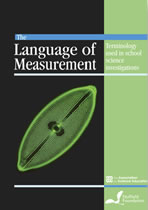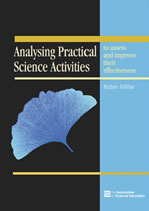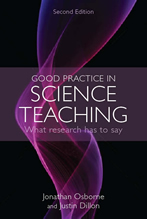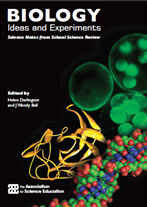
Books
Getting Practical would like to make you aware of new books that reflect current thinking in practical science.
 |
The Language of Measurement
Designed to help teachers become confident about the special terminology associated with practical investigations, when it should be used, and what specific terms mean.
The aim of this booklet is to enable teachers, publishers, awarding bodies and others to achieve a common understanding of important terms that arise from practical work in secondary science, consistent with the terminology used by professional scientists.
To purchase this book, click here.
To view excerpts of this book including the Introduction, part of the Glossary and two Illustrative Investigations, click here.
|
 |
Analysing Practical Science Activities
This booklet provides teachers with the tools to analyse practical activities to clarify the objectives, highlight the main features, and evaluate effectiveness.
To purchase this book, click here.
To view excerpts of this book including the Introduction and the section 'Analysing Practical Activities', click here.
|
 |
Good Practice in Science Teaching - What Research Has to Say Second Edition Edited by Jonathan Osborne and Justin Dillon
This new edition of Good Practice in Science Teaching offers a comprehensive overview of the major areas of research and scholarship in science education.
Each chapter summarizes the research work and evidence in the field, and discusses its significance, reliability and implications for the practice of science teaching.
Thoroughly revised throughout, the new edition includes:
Each chapter has been written by at least one expert who is internationally renowned for the significant contributions made by their research. Each topic is approached in a straight-forward manner and is written in a concise and readable style.
This invaluable guide is ideal for science teachers of children of all ages, and others who work in teaching and related fields. It is an essential text for teachers in training and those studying for higher degrees.
Jonathan Osborne is the Shriram Family Professor of Science Education at Stanford University, USA. He started his career teaching physics in London schools before joining King’s College London, UK in 1985 where he worked until 2008 before moving to Stanford.
Justin Dillon is Professor of Science and Environmental Education and Head of the Science and Technology Education Group at King’s College London, UK. He started his career teaching science in London schools before joining King’s College London, UK in 1989. He is President of the European Science Education Research Association and an editor of the International Journal of Science Education.
To purchase this book, click here.
|
 |
Biology: Ideas and Experiments
School biology is not just about content, it is also about practical skills and scientific enquiry.
Highly illustrated with a range of activities, ideas for games and tasks designed to help students gain a deeper understanding of a topic by actively engaging with it through practical work, discussion, synthesis and application of knowledge.
To purchase this book, click here.
|